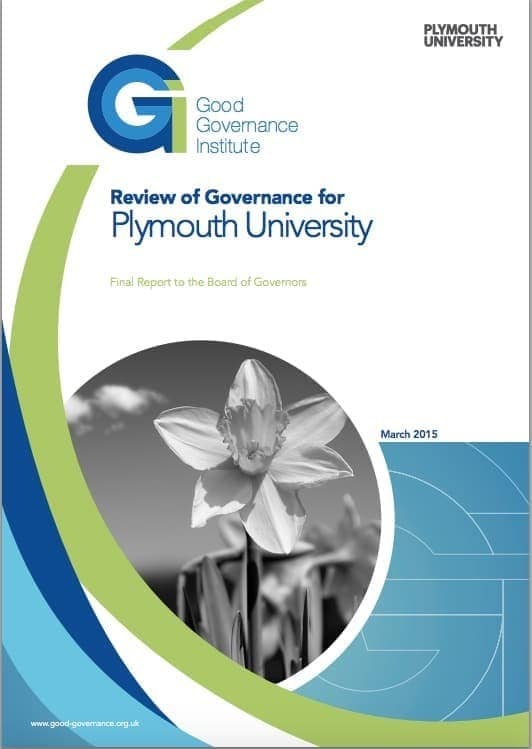I’ve written here before about Governance issues in universities in England, Scotland and further afield. It does seem to me that getting Governance right remains a critical issue for universities and is particularly important in a period of significant challenge and regulatory turbulence.
It can sometimes be all too easy for institutions and governors, individually and collectively, to neglect the need to attend to such matters where there appear to be more pressing concerns.
Lay of the land
Whilst Governance foul-ups are unlikely to feature on many universities’ risk registers, the impact of such problems may be severe. Where it goes wrong it can go really badly wrong as some of the examples highlighted here demonstrate. In these cases the situation has been so bad that it has resulted in major press coverage:

- We’ve had turmoil at Plymouth University which resulted from ‘fractured’ relationships at the heart of the institution.
- Significantly too there was the Woolf inquiry into the links between the LSE and Libya which was centrally concerned with a series of Governance weaknesses.
- There was the rather bizarre series of events at Mount St Mary’s University which started with comments on drowning bunnies and ended up with a full scale Governance crisis.
- And also from the US there were major issues at the University of Virginia where the President was first removed from her post by governors and then later reinstated.
These examples show how much universities can suffer when Governance goes wrong. Despite the relatively low profile of Governance, it is a critical factor in institutional success and, while good Governance can’t compensate for poor management, poor Governance can seriously hinder a university’s progress and drag an institution backwards for months or years. At the very least a Governance-generated crisis can represent a major diversion for university leaders and governors and result in significant lost opportunities or missed targets.
It seems to me that many in the sector, including some of those in leadership positions, are sometimes under-informed about Governance matters. This is partly because unless you have direct exposure to the operation of a governing body, either as a member or by attending meetings, it is quite difficult to get a real sense of what is going on. It’s also possibly down to Governance never sounding like the most exciting of topics and that there is a tendency to focus on Governance issues and guidelines only when there is a crisis.
Leave the capital
There is another reason too I would suggest, which is that the language of governance has become more commonplace in managerial discourse. However, the everyday references to governance we often hear in and around university meetings and policy papers are really, I think, more usually about the normal business of committees and how they work and the management structures which interact with them.
Really this is governance with a lower case ‘g’, rather than the Governance with a capital ‘G’. This is not to say that small ‘g’ governance is not important to get right, it absolutely is, it’s just less significant and also may, by the free and easy use of the term, distract from the core challenges here and may serve to provide unwarranted reassurance that Governance (with a big ‘G’) is all fine. This wider usage of governance has (I suspect) made its way into general university use through the greater influence of those working in IT, where staff will talk knowledgeably about the importance of ‘governance’. What they really mean is a set of boards or committees overseeing the progress of a project.
Such small ‘g’ governance talk often seems to lend a quite unwarranted authority on ALL matters of Governance (as well as governance) to those who deploy it. This perhaps serves to distract from the bigger issues facing institutions. Put simply, if we think that Governance is fine because governance (or even IT governance) is fine then we are likely to have a problem; the people who talk confidently about the latter are unlikely to have much of a handle on big ‘G’ Governance proper.
In these times
This position of general lack of awareness of big ‘G’ Governance and governing bodies does need to be addressed. It seems to me that tomorrow’s university leaders have to know how to operate at this level, which means they need to have opportunities and structures which enable them to engage with governing bodies and understand how they work. Despite the many hundreds of pro-vice-chancellors, deans, and heads of professional services who have been through the Leadership Foundation’s Top Management Programme (TMP) – which does cover Governance – I fear that it is likely that there is still limited engagement and understanding of key Governance issues among prospective vice-chancellors.
The Leadership Foundation has a comprehensive Governance website and publishes regular guidance on Governance matters, as well as running frequent events for members of governing bodies, chairs, and secretaries. There is also the Committee of University Chairs Higher Education Code of Governance, but I do suspect this and the LFHE publications are not widely read. It cuts both ways though, and external members of governing bodies have a responsibility to ensure they better understand the different dimensions of university life, and especially the experiences of academic staff and students.
Touch sensitive
What is to be done then? I’d suggest that the following ten points would be a start.
- Governors should be encouraged to connect with the Senate/Academic Board be it through cross-attendance or joint events.
- The governing body should seek to ensure it is properly informed about the core issues regarding teaching and research, including through direct interactions with academic staff. Indeed it is now a requirement in terms of the annual assurance return to HEFCE that English university governing bodies report that they are reassured directly on actions being taken to improve the student academic experience:
- The governing body has received and discussed a report and accompanying action plan relating to the continuous improvement of the student academic experience and student outcomes. This included evidence from the provider’s own periodic review processes, which fully involve students and include embedded external peer or professional review.
- The methodologies used as a basis to improve the student academic experience and student outcomes are, to the best of our knowledge, robust and appropriate.
- Significant internal briefing and communication work will be required: all staff (and many students) need to know about the place, role and powers of governing bodies, and not just senior managers.
- Governors – both staff and lay members – need wide exposure within the institution so that they are visible to staff.
- Diversity of governing body membership is vital and brings major benefits for the board and decision-making. It requires clarity and determination in order to ensure that the recruitment and selection processes in place for new members address the current and future needs of the governing body in terms of skills mix as well as in diversity.
- Maintaining an element of commonality across the UK is important for the sector as a whole. Although there are changes afoot in higher education Governance in Scotland, it is important that universities continue to share knowledge and experience across the UK sector.
- Don’t forget the Registrar/Secretary. Getting the ‘golden triangle’ right, as noted in the Plymouth governance report, is particularly important:
4.1 iii) The ‘golden triangle’ of Chairman, Vice-Chancellor and University Secretary/Clerk to the Board sits at the heart of effective institutional governance: if one side is fractured, good governance is endangered; if two sides are fractured, governance is in peril;
- Student involvement is key. Not only do students need to be full and equal members of the governing body; they need to be trained, encouraged, and supported to play the fullest possible role.
- Don’t waste time worrying about the size of the governing body. All such bodies go through periods of speculating about the positive impact on effectiveness, if only they were smaller or larger than they currently are. Such a focus on board size is a diversion. It’s what the governing body does, not how many people sit on it, that counts.
- And finally, one of the most important areas is the training and preparation for participation of future university leaders. Somehow they have to be enabled to observe, learn about and understand how Governance works in practice. This might happen through shadowing a governing body member, perhaps co-presenting on a topic or even through simply attending several meetings as an observer (all in addition to other training provided by the Leadership Foundation and others).
Repetition
To restate the point made above. Even if all these issues are addressed it still requires other factors to achieve success – good Governance can’t compensate for poor management. And, whilst bad Governance can struggle to ruin good management, it certainly doesn’t help. Governance (with a capital ‘G’) remains one of the big issues facing universities and it has to have more prominence. If we fail to focus more efforts in this area then the possibilities of new fractures, leading to new governance perils, will grow. And that won’t be good for institutions, or the sector’s wider reputation.














Lots of points here that I agree with Paul. Might I add that better exploration and understanding of the difference between management and governance (big G or little g) is something we might add to your list? Phil
Absolutely – very good point.
Good summary. Training and team building for the Governing body are often neglected.
Very much agree with you, Paul. I particularly agree with your point about diversity and selection, which are key to good governance. There is a temptation to believe that expertise in a profession such law or accountancy or experience in property management, is sufficient ground for appointment without ensuring there are shared values, and an appreciation of the public service role of higher education. Given that most governors are exposed to university business for a small proportion of the year, amounting to hours rather than days, ensuring they actually understand what is going on is a challenge. I also agree… Read more »